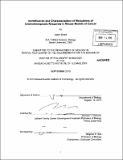Identification and Characterization of Modulators of Chemotherapeutic Response in Mouse Models of Cancer
Author(s)
Doles, Jason (Jason David)
DownloadFull printable version (16.07Mb)
Other Contributors
Massachusetts Institute of Technology. Dept. of Biology.
Advisor
Michael T. Hemann.
Terms of use
Metadata
Show full item recordAbstract
Chemotherapeutic drug resistance is a major cause of cancer treatment failure. While much attention has been focused on the genetics of tumor development, less is known about the genetic determinants of therapeutic outcome. As a central focus of my graduate work, I have employed pool-based shRNA-mediated screening methodologies using the Ep-myc lymphoma model to identify genes that modulate the response to front-line chemotherapeutics. In addition to identifying known mediators of chemotherapeutic response, these screens also uncovered several novel genetic targets that influenced the cellular response to selected chemotherapies. Initial in vitro screening experiments identified topoisomerase 2A levels as critical determinants of doxorubicin response. Subsequent follow-up experiments - including one demonstrating doxorubicin sensitization in the presence of topoisomerase 1 shRNAs - revealed important insights into topoisomerase biology and the clinical heterogeneity associated with topoisomerase poison-based therapies. In a related screen, I also found Nek4 levels to be hitherto unappreciated determinants of the cellular response to microtubule poisons. Importantly, I went on to demonstrate that this effect on microtubule poisons was attributable, in part, to Nek4 regulation of microtubule function. In addition to screening-based approaches, I also show that targeted shRNA-mediated knockdown strategies are useful for probing in vivo chemotherapeutic response. By suppressing translesion synthesis, initially in Bcell lymphoma and later in a newly developed transplantable model of murine lung adenocarcinoma, I show that tumors are not only sensitized to clinically relevant chemotherapeutics, but are also partially protected from drug-induced mutagenesis and acquired resistance. Taken together, these results described in this thesis underscore the importance of both large-scale, unbiased gene discovery and target-based interrogation of genetic determinants of chemotherapeutic response.
Description
Thesis (Ph. D.)--Massachusetts Institute of Technology, Dept. of Biology, 2010. Cataloged from PDF version of thesis. Includes bibliographical references.
Date issued
2010Department
Massachusetts Institute of Technology. Department of BiologyPublisher
Massachusetts Institute of Technology
Keywords
Biology.